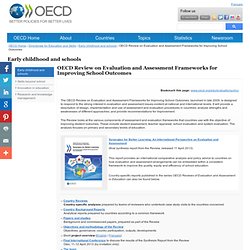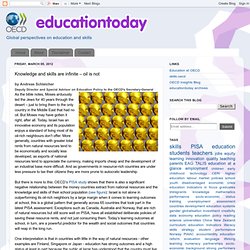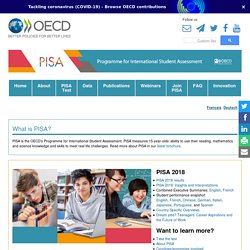

Review on Evaluation and Assessment Frameworks for Improving School Outcomes. Bookmark this page: www.oecd.org/edu/evaluationpolicy The OECD Review on Evaluation and Assessment Frameworks for Improving School Outcomes, launched in late 2009, is designed to respond to the strong interest in evaluation and assessment issues evident at national and international levels.

It will provide a description of design, implementation and use of assessment and evaluation procedures in countries; analyse strengths and weaknesses of different approaches; and provide recommendations for improvement. The Review looks at the various components of assessment and evaluation frameworks that countries use with the objective of improving student outcomes. Knowledge and skills are infinite – oil is not. By Andreas SchleicherDeputy Director and Special Advisor on Education Policy to the OECD's Secretary-General As the bible notes, Moses arduously led the Jews for 40 years through the desert – just to bring them to the only country in the Middle East that had no oil.

But Moses may have gotten it right, after all. Today, Israel has an innovative economy and its population enjoys a standard of living most of its oil-rich neighbours don't offer. More generally, countries with greater total rents from natural resources tend to be economically and socially less developed, as exports of national resources tend to appreciate the currency, making imports cheap and the development of an industrial base more difficult. The Academy of Europe. PISA.
This years focus is mathematics with an additional test in creative thinking.

The new PISA 2021 mathematics framework was recently launched. Preparations for this test are underway with participants from 36 OECD members and likely 50+ non-members involved. The PISA 2024 innovative domain, Learning in the Digital World, aims to measure students’ ability to engage in self-regulated learning while using digital tools. The tasks measure students’ capacity to monitor their progress, use feedback and stay engaged while they build models and develop solutions with digital tools.
These skillsets are essential in preparing students to learn autonomously in an increasingly complex and digital world.